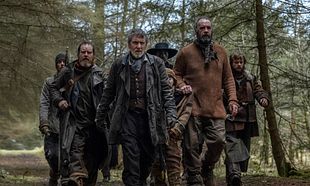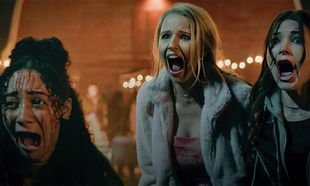Henry Sugar (Benedict Cumberbatch) is a wealthy but indolent man who comes across the account of Imdad Khan (Ben Kingsley), a magician who was able to see without using his eyes. The account, written by a doctor (Dev Patel) in Calcutta, inspires Henry to learn the method in order to use it to amass even more money through blackjack, but soon finds himself bereft of any joy or excitement in the process...
Given how Wes Anderson's work to date has been feature-length movies and the occasional advertisement here and there to pay his way, it's odd that he's now decided to turn to what's effectively the beginning of an anthology series based on some of the lesser-known work of Roald Dahl. 'The Wonderful Story of Henry Sugar' is taken from the volume of short stories of the same name, with Anderson assembling a small cast of English actors.
Ralph Fiennes, who starred in 'The Grand Budapest Hotel', pulls off several roles - including Roald Dahl himself, his introduction taken almost verbatim from an old documentary about the author - as do all of the other cast. Ben Kingsley plays a conjurer who can see without his eyes and a blackjack dealer, Benedict Cumberbatch plays the titular character and the titular character's famous makeup artist, while Dev Patel plays both a surgeon and an accountant connected to the story. Richard Ayoade and Rupert Friend both turn up for a spell, but really, the short is propelled by the chatterbox narration of Kingsley, Fiennes, Cumberbatch and Patel with the scenery changing with each passing sentence and paragraph.
Anderson's work feels weirdly suited to this kind of anthology concept, pulling together a troupe of actors wandering around a story and arriving at its ending with the appropriate speed and pacing. When compared to something like 'Asteroid City', you get the sense that 'The Wonderful Story of Henry Sugar' is very much exactly as it was meant to be and hasn't been artificially prolonged to fit a feature-length runtime. Indeed, the closest comparison one could make to 'The Wonderful Story of Henry Sugar' is one of the chapters of 'The French Dispatch'. Much like its source material, 'The Wonderful Story of Henry Sugar' has an artful brevity to it. It requires no more and no less to tell its story, fully realised and fully formed in each and every sentence.



















































































